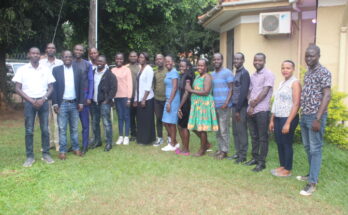With shattered dreams, out-of-school girls plot for a hopeful future
Omoro
At 16 years and in a frail condition, Jane* is already trapped in two precarious situations. She has to nurse herself to recovery after a caesarian and at the same time breastfeed her baby.
Five days ago, when her ‘water broke’, Jane had no idea what had happened to her. But her mother did: “I felt a lot of pain,” Jane narrated.” I thought I was sick”. And on her due date, her mother, who at first rushed her to two nearby health facilities and failed to get doctors there that night, Lydia finally gave birth at St. Mary’s hospital Lacor, 25 kilometers away from her village.
“Doctors said my baby had breathing problems,” Lydia added as she sat on a papyrus mat, grimacing uneasily, adding that she was lucky that her baby made it alive.
But Jane’s problems are far from over. She is in pain. The stitches on her belly are still fresh and very achy, she says, yet she has to feed her baby.
Her former head teacher, Pauline Wamito, says four girls (including Jane) have dropped out after getting pregnant since the lockdown last year, and the overall enrolment at St. Theresa Primary School, where she heads, has also reduced from 194 to 96 students. And now, she adds, the school can’t support these girls, like most rural schools in Uganda, despite the government saying that they can resume.
“We don’t have a changing room. [for girls],” She told Northern Uganda Media Club (NUMEC) in an interview, adding that “if a pregnant student wants to rest, we are forced use the [school] store”.
Jane first met her boyfriend in August last year, shortly after the government announced the closure of all schools as part of the measure to curb the spread of COVID-19. When students returned home amid a lockdown put in place, many reports of school-going girls like Jane emerged. Whereas the government announced afterward that these girls would be allowed to study as it began its phased reopening of schools early this year, most girls failed to report back. Some were already mothers; some were expectant.
A survey conducted by Comboni Samarians of Gulu, a faith-based organisation, last year during the lockdown shows that 17,653 teenagers were impregnated during this period in Acholi sub-region, with Amuru leading with 6,549 cases.
Comboni Samaritans are sponsoring these girls to continue their formal education or vocational skills training. But Michael Oleke, the Project Development Consultant at Comboni Samaritan, says some girls have failed to return to school due to stigma.
And “the other reason is that some parents tend to marry off their daughter because they gave birth out of wedlock,” Oleke adds.
His colleague, Thomas Tabu, Comboni Deputy Executive Director, said a drive, dubbed ‘Awakening of Hope’, is already urging well-wishers to raise funds. The program, Tabu said, requires Shs. 3.5 bn (990,000 USD) to help support these girls for the next three years.
On fighting stigma, Tabu revealed that they have begun a psychosocial support program aimed at ‘creating a link between parents, teachers and the community to fight the stigma’ that these girls face.
“We are building the mental side of these children,” Tabu said. “The community thinks when girls get pregnant in school, she is wasted. But this does not mean you cannot have a successful life”.
Caesar Akena, Gulu District Education Officer agrees with him. Akena wants sex education to be collective responsibility and not be left in the hands of only senior women teachers.
As for Jane, she didn’t know who to go to, or who to seek advice from. When she began missing her period, she consulted Pamela*, her friend, who had earlier dropped out of school after getting pregnant. On discovering that she was really pregnant, Jane kept it a secret. Her mother later found when she began missing classes for fear of being called names.
For two weeks, NUMEC has been asking girls, who got pregnant during the lockdown last year in Acholi sub-region, including Jane, to tell us their stories and also show us what their life is like in real time.

This is the story of teenage girls, who got pregnant during the lockdown and later dropped out of school. NUMEC followed them at their homes, visited some of their teachers, and also met with district education officials, to understand their experiences, fears, and hopes during the pandemic.
As for Jane, her life is still swallowed by uncertainty. Her boyfriend disappeared after making promises that he would marry her after giving birth. And now, as she swaddled her little one, at that moment all she could think of is “protecting him”.
Pamela’s* story, Omoro
A few meters away from Jane’s home, still in Otumpili village, her childhood friend, Pamela* was also abandoned by her boyfriend during the lockdown after he realized she was pregnant. Like Jane, and most girls that NUMEC spoke to, pregnancy seems to be a new experience. Many of them didn’t know what to do when they conceived, and many remained discreet about it at first. Missing out on antenatal visits to follow the condition of the baby puts the life of the baby and that of a teenage mother at risk especially here in Uganda where one out of four adolescents get pregnant and child mortality death is at 45.8 per 1,000 live births.
In Pamela’s case, she felt, “lazy and vomited a lot at first”. Like Jane, she too, thought she was sick at first. But her mother had already begun suspecting something else.
And when she discovered in April that, indeed, she was going to have a baby, she decided to drop out of school because of fear of being stigmatized. Her boyfriend also abandoned her. And Pamela’s mother decided to take over the responsibility of looking after her, paying her medical bills, and also accompanying her to the hospital.
But it all came at a cost. In her weak state, Pamela had to help her mother cultivate the garden daily. After all, it was the family’s main source of livelihood. And when her time came, she also gave birth after undergoing a caesarian operation. Still, her boyfriend was nowhere to be seen.
“I don’t know where he is,” she says. “I gave up on looking for him”. Pamela’s priority at the moment is to enroll in a tailoring course so that she can be able to fend for her baby and aging mother.
Kitgum district
Further up north in Paibwo village, Kitgum district, 103 km from Omoro, Harriet* hurriedly trekked early in the morning to the trading center. It was on a market day and she wanted to buy her baby’s essentials. With a bucket list of things in her mind, she hoped this would be the perfect day to get these things at a cheaper price with all her savings.
Last year, when the government closed all schools and asked students to return home due to the coronavirus, Harriet was among them. Like most girls, she hoped that this crisis would soon end and resume class. But she didn’t know that this would be her last time in class.
When she started a relationship and soon began suspecting that she was pregnant, she and her boyfriend, secretly, decided to go to visit a local clinic to check for pregnancy. At her school, Pandwong Primary School, her senior woman, Christine Akullu, says already “more than 10 girls [had] got pregnant during” and now, Harriet was part of the tally.
When the doctor finally broke the news to her, Harriet knew her life was going to change. The thought of knowing that at that point there was a tiny someone already growing and soon would curl up inside of you was something she knew would change her life. For fear of her mother’s reaction, Harriet decided to run away from home and decided to stay with her boyfriend as they both waited for the new member of her family. And that meant she had to pull out of school.
Her mother, Alice Akullu is still bitter and feels ‘disrespected’. But she hopes Harriet ‘can still come to her right sense’ and consider schooling again.
“I wanted her to study,” She emphasized again. “I still do”.
Harriet says she still wants to go back to school but her child needs to grow ‘a little’.
Her boyfriend, who also dropped out in his primary seven last year after his father was arrested by politics, is supportive. At the moment, he is working as a casual labourer to scrape a living but he is saving up to study building and construction to support both Harriet and the baby.
So that evening when Harriet returned from the market, with her baby’s items in a plastic bag, all she could think of was the welfare of her baby.
Omoro
Back in Otumpili village. Jane still misses school a lot—and her favourite hobby, Acholi cultural dancing. She hopes to go back to study soon, and hopefully, one day fulfill her dream of becoming a teacher. But for now, her focus is raising her baby.
Her mother is willing to be patient but worries she might fail to pay for her daughter’s education due to financial constraints. “I want Jane to study”, she says, tending her vegetable garden. “If I can manage that, it would mean something”.
NUMEC used pseudo names to protect the identity of the girls in the story
This story was reported with grant support from WAN-IFRA Women in News Social Impact Reporting Initiative (SIRI)




